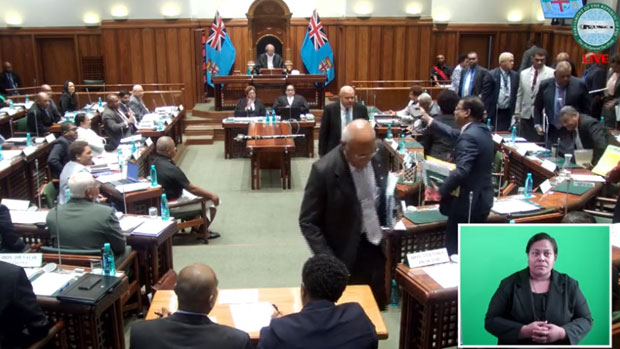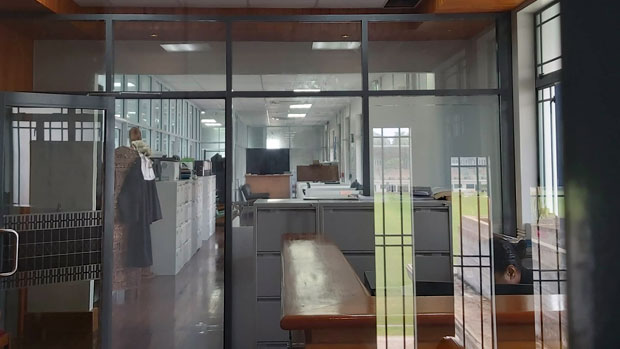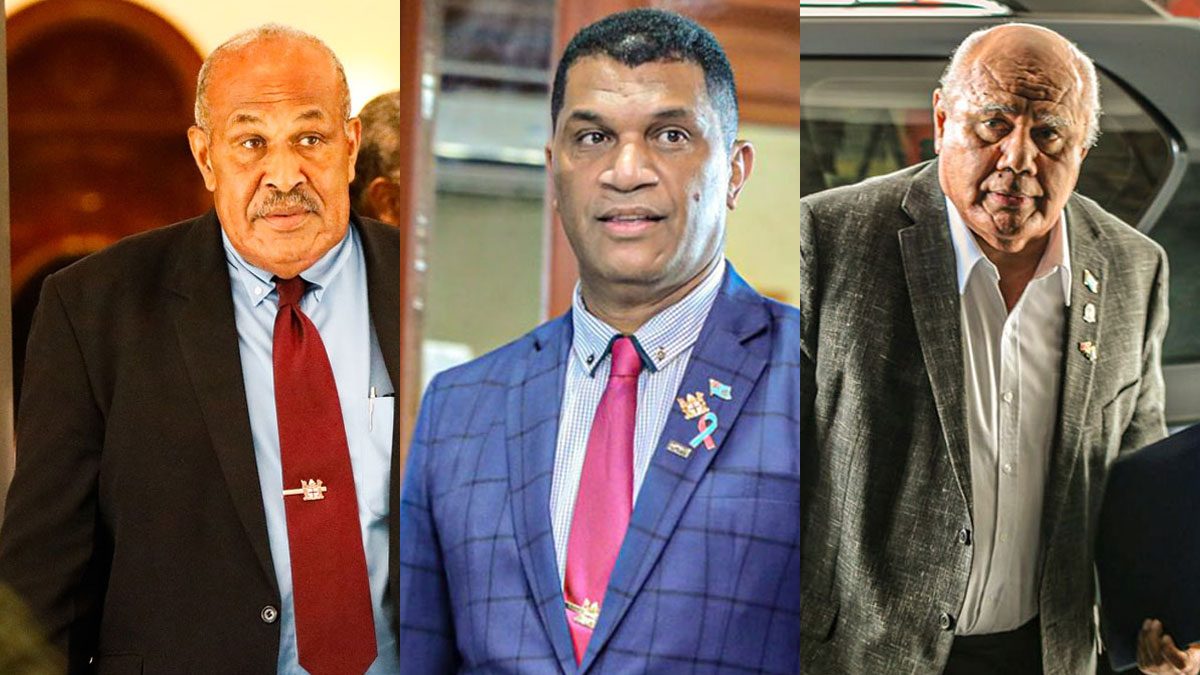
SODELPA and National Federation Party parliamentarians have walked out of parliament after SODELPA MP, Viliame Gavoka’s petition for a committee to look into the issue of mining by a company at the Sigatoka River Mouth, was not accepted by the Speaker of Parliament, Ratu Epeli Nailatikau.
Gavoka says the Speaker’s ruling is unacceptable, and they are raising an issue of great importance to the people of Sigatoka.
He says 900 people have signed the petition and they are asking for a committee to look into this matter.
The opposition parliamentarians then walked out of parliament.
Parliament has resumed without the opposition.
Opposition MPs are seen walking out of Parliament, Opposition after their meeting in the office
AG wants the opposition to be given a lesson
Attorney General and Minister for Economy, Aiyaz Sayed-Khaiyum has asked the Speaker of Parliament, Ratu Epeli Nailatikau to give a ruling that Opposition members can’t just walk out of the parliament and they need to be given a lesson.
Sayed-Khaiyum asked for a ruling that opposition members should not be allowed to come back to parliament for at least a period of time.
Ratu Epeli then told the government members that he is the only Speaker where the opposition has walked out of the chamber and where the government has also walked out.
He says it is not a new thing for him.
Ratu Epeli then adjourned for an early morning tea.

Opposition meet behind closed doors
The opposition will now write to the Speaker and get clarification on his rulings. They have not confirmed as to when they will return to parliament.
Speaking in the opposition office, Opposition Leader, Sitiveni Rabuka says they exercise their right to present their views and if they are not happy with the ruling, then the honourable thing to do is to walk out of the chamber.
NFP Leader, Professor Biman Prasad says walk out of parliament is a way to show their disappointment and it happens in most parliaments.
Earlier today :
Gavoka’s Petition Not Allowed while Speaker makes it clear that online petitions are not allowed
Speaker of Parliament, Ratu Epeli Nailatikau has confirmed that SODELPA MP, Viliame Gavoka’s petition for a review of mining by a private company at the Sigatoka River Mouth, will not be allowed in parliament as it does not meet the requirements.
While delivering his ruling, Ratu Epeli says any petition should be seeking action within the powers of parliament to take.
Ratu Epeli also emphasized the need to ensure that parliament upholds and respects the judiciary, legislature and executive, and it is not for parliament to instruct the executive.
He says the constitutional separation of powers must always be upheld and never be jeopardised.
Ratu Epeli also says the activities of a non state entity do not fall under the jurisdiction of parliament.
The Speaker also confirms that online petitions will not be allowed in parliament as verification of signatures is important. He says only petitions with handwritten signatures will be accepted.
SODELPA MP, Viliame Gavoka interjected the Speaker twice to speak and Ratu Epeli Nailatikau warned him not to interrupt him again while he was delivering the ruling.
Meanwhile Ratu Epeli also confirmed that SODELPA MP, Lynda Tabuya had two petitions however she withdrew them yesterday.
Speaker’s Ruling in relation to Petitions received

Honourable Members, as alluded to in my communication yesterday on the three petitions from the Opposition, I now inform all Honourable Members that two petitions from Hon. Lynda Tabuya were withdrawn yesterday.
Honourable Members, I had received a third petition from the Hon. Viliame Gavoka and after having scrutinised the petition, I will provide my ruling on whether it will be presented to Parliament.
Pursuant to Standing Order 37 clause (2)(b), the Speaker must scrutinise a petition to “ensure that the petition … is seeking action which lies within the powers of Parliament to take”. As such, I have scrutinised the petition to ensure that –
Firstly, it requests a clear action for Parliament to take; and
Secondly, such action lies within the powers of Parliament to take.
The petition from the Hon. Viliame Gavoka on behalf of the people of the Tikina Nasigatoka against the plan to mine Magnetite at the mouth of the Sigatoka river. This petition requests that Parliament “refer to the Standing Committee on Natural Resources to conduct a holistic inquiry into the planned mining of the Sigatoka River mouth with the view to protect the interests and well-being of the people of the Tikina Nasigatoka and surrounding communities”.
My first observation in relation to this petition is that it does not specify whether the issue in contention is the authority of the Director responsible for mines to grant a mining lease under which the mining activities are being conducted, or if the issue in contention is the general mining activities of any company that may be holding a lease or permit at this time.
That said, it is my ruling that regardless of the issue of contention, this petition cannot be tabled in Parliament as in each instance it seeks action which is not within the powers of Parliament to take.
Firstly, if the issue in contention is the authority upon which such mining activities have been sanctioned, I must reiterate my earlier rulings in relation to petitions in Parliament where I have emphasised the need to ensure that Parliament upholds and respects the constitutional separation of powers between the three Arms of the State, that being the Judiciary, the Legislature and the Executive. It is not for Parliament to direct or instruct the exercise of the Executive Authority when a written law expressly gives the power and authority to the Executive, whether a Minister or a Public Officer, to make decisions under any such law.
The Mining Act 1965 sets out the process under which a person may apply for and be granted a mining permit or lease. If a person fulfils the requirements under that Act the Director responsible for mines may grant the person a mining permit or lease under section 31 or 32 respectively.
Again, I remind Honourable Members that the use of petitions in Parliament for such a purpose is fundamentally and legally flawed and ignores the fact that, by written law, Parliament has given the authority to the relevant officer to make the decision. The constitutional separation of powers between the respective Arms of the State must always be upheld and never jeopardised.
That said, if the petition is predicated upon the contention that Parliament must review the mining activities of whatever company may currently be operating in the area, I must again conclude that the petition seeks action which is not within the powers of Parliament to take.
The activities of a non-State or private entity do not fall within the ambit of Parliament’s responsibility. Parliament is responsible for the enactment of laws and scrutinising Government administration.
It is not within Parliament’s mandate to scrutinise the activities of a non-State entity. If this were so, and bearing in mind the fact that some Honourable Members seem to be operating under the presumption that a petition may be admissible despite only having a single signature, individuals may subject Parliament to a barrage of petitions inquiring into the business activities of any company in the private sector.
This is not the purpose of Parliamentary petitions and it seeks the intervention of Parliament in an area for which Parliament is not responsible.
As such, on this ground as well, I therefore rule that the petition cannot be tabled before Parliament as it does not meet the requirements under Standing Order 37.
Ruling in Relation to Online Signatures
Honourable Members, for your information, I also received a letter from the Hon. Lynda Tabuya seeking a ruling on Standing Order 37 in relation to the definition of “signatures” and whether they may include electronic signatures.
I note that the term “signature” is not specifically defined in the Standing Orders or the Constitution. As such, and as stated above, it is the prerogative of the Speaker under Standing Order 2 to interpret the Standing Orders.
I agree that in this new age of technology it is imperative that we, as they say, ‘move with the times’. Technological advancements have allowed for easier access to a great deal of services and more efficient ways of doing things. Our beloved nation has worked hard to stay abreast of these developments, even promulgating legislation such as the Electronic Transactions Act 2008 which addresses the recognition of electronic signatures. This, I believe will provide some direction for us in assessing this matter.
Honourable Members, section 14 of the Electronic Transactions Act 2008 states that, in relation to written laws, a requirement that a signature be provided may be met by an electronic signature if there is a method provided for identifying the person signing and the person receiving the signature consents to this method.
I believe this is a test that is appropriate to apply in this instance. As such, I must consider the method used to present with me an electronic signature, the capacity of this method to accurately identify the person making the signature and then decide whether we shall consent to such method.
In making this assessment, I have also considered the practices of similar jurisdictions in this regard. I note that the United Kingdom House of Commons and the Australian House of Representatives allow for electronic petitions and by extension electronic signatures; however, the platform for these petitions is the official websites of their respective legislatures. This is done in order to assist in the identification of the individuals signing the petition.
Honourable Members, Parliament is the embodiment of the wishes of the Fijian people – serving as their ultimate form of representation. That said, online petitions which are not hosted on an official platform that provides for the verification of a person’s identity may be susceptible to exploitation by any person with no connection to Fiji such as foreign citizens.
With that in mind, I hereby rule that petitions presented must attach hand-written signatures therefore, petitions presented with online signatures will not be considered.
Thank you Honourable Members.
Ruling on Standards for Petitions
Honourable Members, having delivered my rulings on the petition and matter before me, I now wish to provide a ruling in relation to the standard of petitions submitted for tabling before Parliament which shall, I hope, ensure that we are all clear as to how this process is intended to operate.
I have on numerous occasions emphasised several of the requirements for petitions that I have repeated today and yet I continue to receive petitions which do not meet these requirements. In 2019 alone I delivered 6 rulings emphasising these requirements and yet today I have had to address another such petition. Honourable Members, I had hoped that Members would conduct their own legal research, perhaps reading Erskine May’s Treatise on the Law, Privileges, Proceedings and Usage of Parliament, before submitting further petitions but it does not seem that this has eventuated.
As the Speaker, I am empowered under Standing Order 2 clause (1) to interpret the Standing Orders. In doing so, Standing Order 2 clause (2)(c) states that I must be guided by “established practices of legislative bodies in other jurisdictions that are similar in nature to Parliament”.
As I have already stated, pursuant to Standing Order 37 clause (2)(b), the Speaker must scrutinise a petition to “ensure that the petition … is seeking action which lies within the powers of Parliament to take”.
This is a requirement that is not uncommon in jurisdictions operating under a Westminster system. It is well established that petitions in the UK Parliament must and I quote “contain a clear request, or ‘prayer’, to the House for a remedy which is within its competence to grant”. Furthermore, I take note of the fact that the UK House of Commons through the UK Petitions Committee has developed their own standards for the admissibility of petitions in order to give effect to this requirement.
As such, I believe that it is time that we develop standards of our own, taking into account similar standards used in jurisdictions such as the United Kingdom.
I believe that this will provide clear and distinct rules for the admissibility of petitions.
Please note that these standards do not exceed the source of their authority as they are in one way or another simply a clarification of the requirements under Standing Order 37 or of the obligations set out in the Constitution or written law.
However, to be clear, I am exercising my authority as Speaker pursuant to Standing Order 2, which empowers me to interpret the Standing Orders, and Standing Order 20 which empowers me to “do everything necessary or convenient to be done for, or in connection with, the performance of [my] functions under these Standing Orders”.
Honourable Members, I hereby rule that in order for petitions to be tabled before Parliament they must comply with the following standards –
1- The petition must be in English and must attach hand-written signature(s).
2- It must ask for a clear action from the Fijian Government or Parliament.
3- It must not seek to usurp the authority of the executive or the judiciary as prescribed by law or subvert administrative or legal processes prescribed by law.
4- It must be about something that the Fijian Government or Parliament is responsible for. This means it must not seek action from private individuals or entities that the Fijian Government or Parliament is not responsible for. Furthermore, it must not ask for someone to be given a job, licence, permit, contract or honour or to lose such job, licence, permit, contract or honour, including petitions asking for a vote of no confidence in a person outside of Parliament and petitions calling for such a person to resign.
5- It must not refer to a matter that is subjudice which means that, put simply, it must not seek to deal with any matter that is before the courts including matters on trial or on appeal. Furthermore, it must not contain material that may be protected by an injunction or court order.
6- It must not seek to infringe or violate the rights of a person guaranteed under the Constitution or a written law.
7- It must not be offensive or extreme in its views. That includes petitions that attack, criticise or negatively focus on an individual or a group of people because of their actual or supposed personal characteristics or circumstances, including race, culture, ethnic or social origin, colour, place of origin, sex, gender, sexual orientation, gender identity and expression, birth, primary language, economic or social or health status, disability, age, religion, conscience, marital status or pregnancy or opinions or beliefs.
8- It must not be defamatory or libellous, or contain false statements.
9- It must not contain swearing or other offensive language.
10- It must not contain material that could be confidential or commercially sensitive.
11- It must not be likely to cause personal distress or loss. This includes petitions that could intrude into someone’s personal grief or shock without their consent.
12- It must not accuse an identifiable person or organisation of a crime.
13- It must not name individual officials of public bodies.
14- It must not name family members of elected representatives, e.g. Members of Parliament, or of officials of public bodies.
15- It must not be an act of political campaigning or grandstanding.
16- It must be genuine and not nonsense or a joke.
17- It must not be an advertisement, spam, or promote a specific product or service.
18- It must not be of the same subject matter as a petition that has already been finally dealt with by Parliament during the term of Parliament unless substantial or new evidence in relation to the subject matter of the petition is available and that evidence was not available when the earlier petition was considered.
Honourable Members, I urge you to consider these standards before submitting any petitions to Parliament in the future. I would also advise you all to consider whether the outcomes you seek are best suited for petitions or if there are other parliamentary processes which may better serve you.
That concludes my ruling on this matter.
Thank you, Honourable Members.
Stay tuned for the latest news on our radio stations


